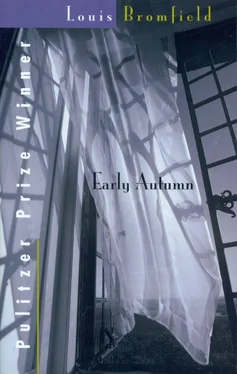“If he wanted to be buried here,” said Olivia, “I can see no reason why he should not be.”
“Cassie will object to raking up an old scandal that has been forgotten.”
“Surely that can’t matter now … when the poor old man is dead. We can be kind to him now … surely we can be kind to him now.”
John Pentland sighed abruptly, a curious, heart-breaking sigh that seemed to have escaped even his power of steely control; and presently he said, “I think you are right, Olivia. … I will do as you say … only we’ll keep it a secret between us until the time comes when it’s necessary to speak. And then … then we’ll have a quiet funeral.”
She would have left him then save that she knew from his manner that there were other things he wanted to say. He had a way of letting you know his will without speaking. Somehow, in his presence you felt that it was impossible to leave until he had dismissed you. He still treated his own son, who was nearly fifty, as if he were a little boy.
Olivia waited, busying herself by rearranging the late lilacs which stood in a tall silver vase on the polished mahogany desk.
“They smell good,” he said abruptly. “They’re the last, aren’t they?”
“The last until next spring.”
“Next spring …” he repeated with an air of speaking to himself. “Next spring. …” And then abruptly, “The other thing was about Sabine. The nurse tells me she has discovered that Sabine is here.” He made the family gesture toward the old north wing. “She has asked to see Sabine.”
“Who told her that Sabine had returned? How could she have discovered it?”
“The nurse doesn’t know. She must have heard someone speaking the name under her window. The nurse says that people in her condition have curious ways of discovering such things … like a sixth sense.”
“Do you want me to ask Sabine? She’d come if I asked her.”
“It would be unpleasant. Besides, I think it might do harm in some way.”
Olivia was silent for a moment. “How? She probably wouldn’t remember Sabine. When she saw her last, Sabine was a young girl.”
“She’s gotten the idea now that we’re all against her, that we’re persecuting her in some way.” He coughed and blew a cloud of smoke out of his thin-drawn lips. “It’s difficult to explain what I mean. … I mean that Sabine might encourage that feeling … quite without meaning to, that Sabine might give her the impression that she was an ally. There’s something disturbing about Sabine.”
“Anson thinks so, too,” said Olivia softly. “He’s been talking to me about it.”
“She ought never to have come back here. It’s difficult … what I am trying to say. Only I feel that she’s up to some mischief. I think she hates us all.”
“Not all of us. … ”
“Not perhaps you. You never belonged here. It’s only those of us who have always been here.”
“But she’s fond of you.”
“Her father and I were good friends. He was very like her … disagreeable and given to speaking unpleasant truths. … He wasn’t a popular man. Perhaps that’s why she’s friendly toward me … on account of him.”
“No, it’s more than that. …”
Slowly Olivia felt herself slipping back into that state of confused enchantment which had overwhelmed her more and more often of late. It seemed that life grew more and more tenuous and complicated, more blurred and indistinct, until at times it became simply a morass of minute problems in which she found herself mired and unable to act. No one spoke directly anymore. It was like living in a world of shadows. And this old man, her father-in-law, was the greatest puzzle of all, because it was impossible ever to know how much he understood of what went on about him, how much he chose to ignore in the belief that by denying its existence it would cease to exist.
Sitting there, puzzled, she began to pull a leaf from the cluster of lilacs into tiny bits.
“Sometimes,” she said, “I think Sabine is unhappy.”
“No … not that. … She’s beyond happiness or unhappiness. There’s something hard in her and unrelenting … as hard as a cut diamond. She’s a clever woman and a queer one. She’s one of those strange creatures that are thrown off now and then by people like us. There’s nothing else quite like them in the world. They go to strange extremes. Horace was the same in a different, less creditable fashion.”
Olivia looked at him suddenly, astonished by the sudden flash of penetration in the old man, one of those sudden, quick gleams which led her to believe that far down, in the depths of his soul, he was far more profound, far more intelligent, unruly and defiant of tradition than he ever allowed the world to suppose. It was always the old question. How much did he know? How much did he not know … far back, behind the lined, severe, leathery old face? Or was it a sort of clairvoyance, not of eternal illness, like Jack’s, but of old age?
“I shall ask Sabine,” she began.
“It’s not necessary at the moment. She appears to have forgotten the matter temporarily. But she’ll remember it again and then I think it will be best to humor her, whatever comes. She may not think of it again for months … until Sabine has gone. … I only wanted to ask you … to consult you, Olivia. I thought you could arrange it.”
She rose and, turning to go, she heard him saying, “She might like some lilacs in her room.” He hesitated and in a flat, dead voice, added, “She used to be very fond of flowers.”
Olivia, avoiding the dark eyes, thought, “She used to be very fond of flowers. … That means forty years ago … forty long years. Oh, my God!” But after a second she said simply, “She has taken a dislike to flowers. She fancies they take up the air and stifle her. The sight of them is very bad for her.”
“I should have known you’d already thought of it.”
For an instant the old man stood facing her with a fixed and searching expression which made her feel shy and led her to turn away from him a little; and then all at once, with an air strangely timid and frightened in a man so grim in appearance, he took her hand and kissing her on the forehead murmured, “You’re a good girl, Olivia. They’re right in what they say of you. You’re a good girl. I don’t know how I should have managed without you all these years.”
Smiling, she looked at him, and then, touching his hand affectionately, she went out without speaking again, thinking, as she had thought a thousand times, what a terrible thing it must be to have been born so inarticulate and so terrified of feeling as John Pentland. It must be, she thought, like living forever imprisoned in a shell of steel from which one might look out and see friends but never touch or know them.
From the doorway she heard a voice behind her, saying almost joyfully: “The doctors must have been wrong about Jack. You and I together, Olivia, have defeated them.”
She said, “Yes,” and smiled at him, but when she had turned away again there was in her mind a strange, almost gruesome thought.
“If only Jack lives until his grandfather is dead, the old man will die happy. If only he can be kept alive until then. …”
She had a strange way of seeing things in the hard light of reality, and an unreal, lonely childhood had fostered the trait. She had been born thus, and now as a woman she found that in a way it was less a curse than a blessing. In a world which survived only by deceiving itself, she found that seeing the truth and knowing it made her strong. Here, perhaps, lay the reason why all of them had come to depend upon her. But there were times, too, when she wanted passionately to be a poor weak feminine creature, a woman who might turn to her husband and find in him someone stronger than herself. She had a curious feeling of envy for Savina Pentland, who was dead before she was born. … Savina Pentland who had been the beauty of the family, extravagant, reckless, feminine, who bought strings of pearls and was given to weeping and fainting.
Читать дальше












